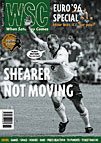 Colin Moneypenny reports on the activities of the FSA during Euro'96 and questions the FA's claim that the tournament was well run
Colin Moneypenny reports on the activities of the FSA during Euro'96 and questions the FA's claim that the tournament was well run
“So if you’re a football player how do you decide which country to play for – is it just the one which pays the most?” This was the genuine enquiry of one American caller – clearly a distant relative of Jack Charlton and surely a future FIFA President – at the FSA London Embassy during Euro ’96.
In Sheffield the Embassy staff were similarly bemused to be asked directions to the local beach, while in Manchester one of the officials from the previous day’s game involving Germany raised a few eyebrows with his question about where he could buy a replica German shirt.
The FSA Embassies which had worked so well in Italy and Sweden were brought home with at least as much success as Euro ’96 itself. Based in each of the eight host cities and staffed entirely by fan volunteers, they acted as advice, information and welcome centres for visiting supporters and reflected the exchanges of goodwill and friendship between fans which were the trademark and surely the most enduring legacy of these championships.
As well as the unintentionally amusing questions such as those above, we were also able to help with lots more serious enquiries and problems, many of which led back to the ill-conceived, secretive, inconsistent, inflexible and ultimately shambolic ticketing arrangements which the FA had imposed.
The fundamental flaw of the organization of the tournament was that ticket prices were too high. This and the authorities’ addiction to theoretical segregation policies – when in reality desegregation on a scale not seen in English grounds for 30 years was a hugely promising aspect of most matches – conspired to produce the canyons of empty seats which were such an embarrassment given the huge global TV audience. At Anfield, as Casiraghi scored Italy’s first goal he ran to the Anfield Road end to be confronted with a bank of multi-coloured seats and a couple of dozen ecstatic but lonely Italian fans. As an image of the tournament it was at least as telling as Gascoigne’s goal, Poborsky’s dribbling or Southgate’s penalty.
The success of the England team may yet fuel another boom for English football, but Euro ’96 has only served to confirm that it is rapidly and mistakenly moving away from its traditional supporter base. Great attention was paid throughout the championships to the needs of television, press, sponsors and corporate clients, but little thought was given to the various problems encountered by those of us daft enough to pay out a small fortune, believing ourselves to be part of the mythic ‘football family’. Whoever would have guessed that ordinary fans were in fact the biggest financial contributors to the tournament?
Hooligan paranoia still dominates English football. The remorseless logic which drove Euro ’96 is that to please the TV moguls and the sponsors you have to price out anyone who could remotely be a ‘security’ threat, even if paradoxically this means you also drive out the only people who, along with the players, make the game the spectacle which makes the business people interested in the first place.
At the end of the tournament, Terry Venables, writing in the Times, tried to sum up the rapidly changing nature of football and chillingly suggested: “In the end I think the working man will have to settle for watching his club on the TV at home or in the pub with his mates.” Sorry Terry, if I can’t afford to go, and the only ones there are in corporate boxes and hospitality suites, I’ll be off with the masses watching the tennis at Wimbledon.
From WSC 114 August 1996. What was happening this month